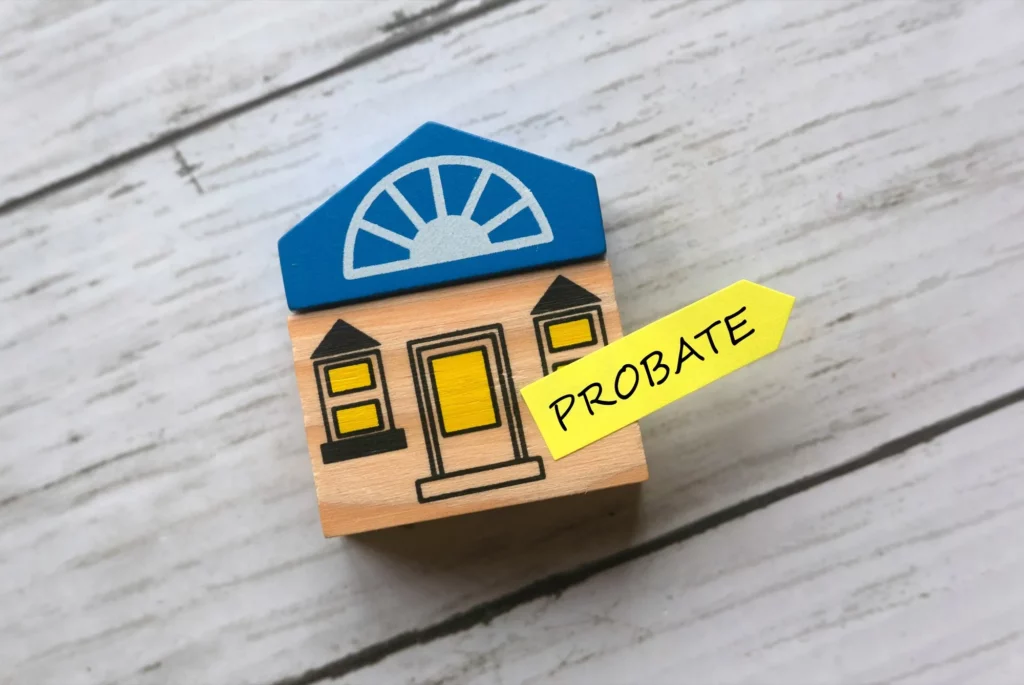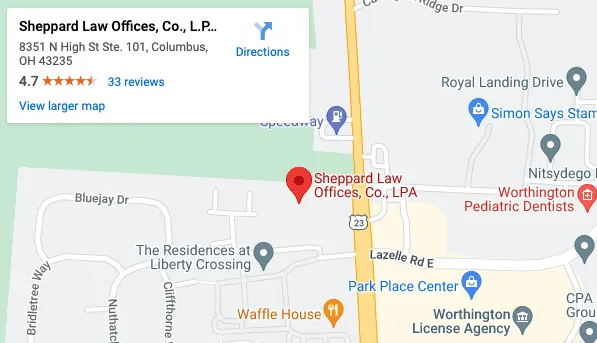Qualified Probate Lawyer in Columbus, Ohio
It’s a sad fact, but at some point in our lives, we’re all likely to suffer the death of a loved one or family member. These moments are, of course, emotionally distressing. But a death in the family can also be deeply demanding at a practical level. Aside from the general disruption of daily life, the family of the deceased may face a series of demanding legal challenges. A reliable probate lawyer can help you through every step of the probate process.
With six locations across Ohio, Sheppard Law Office’s team of probate attorneys are available to guide you through the legal complexities of a loved one’s passing. We can reassure you knowing that your estate legal matters are in capable hands, giving you and your family the space you need to grieve.
Why Do I Need a Probate Lawyer in Columbus, Ohio?
Probate is the procedure through which deceased individuals’ estates are settled. It is a judicial proceeding, thus it may be complex and entail legal jargon. The appropriate handling of a will is essential for anybody making a will, any beneficiary of a will, and anyone nominated as the executor of a will.
Using their understanding of probate law, our skilled Columbus probate lawyer can assist with the administration of a deceased person’s estate. We can ensure that the deceased’s wishes are carried out and that their heirs get any inheritance with little worry.

Creating a Will
There are do-it-yourself-will writing solutions on the market, but if you do it incorrectly, your heirs will suffer the repercussions. Not only may a badly written will be disputed, but it can also cause your heirs anguish and disagreement. The best method to ensure that your final desires are carried out is to have our experienced probate lawyer in Columbus, Ohio create your will.
Safeguard the Estate
Our skilled Columbus probate lawyer can assist safeguard the intentions of the deceased and the interests of their heirs. Sometimes, legal claims are raised after a person’s death. It is difficult to defend against these claims against the estate without legal experience.
Hiring us to manage claims against the estate reduces the worry felt by heirs who must navigate a new procedure during a potentially trying period.
Reduce Family Discord
A death can elicit a variety of emotional responses. There is sorrow, but there may also be conflict amongst family members and other heirs. Disputes about the estate do arise due to divergent expectations.
Our competent probate lawyer in Columbus, Ohio may be able to alleviate these tensions more effectively than others who are more directly involved. Our professional detachment and knowledge of the probate procedure might help to soothe the situation.
Accelerate Probate
Depending on the specifics of the will, the probate procedure can be complicated and may not go without complication. Our probate lawyer in Columbus, Ohio can assist an unskilled executor through the legal process. We can assist you in resolving the numerous financial and legal issues that emerge with little bother and delay.
Help Executors and Successors
As an executor, you are likely to have several questions about how to carry out your duties. You may have concerns regarding the probate procedure and what to expect as an heir. Our Columbus probate lawyer reduces misunderstanding and uncertainty regarding these legal problems.
We can assist executors with court filings, debt settlement, asset valuation, and inheritance distribution. The executor’s position is loaded with possible dangers that expose them to personal legal problems. Professional assistance may be a relief.
What Constitutes Probate?
Probate is a legal procedure that occurs after a person’s death. It contains:
- Establishing in court the validity of a deceased person’s will (usually a routine matter)
- Identifying and inventorying the dead person’s possessions and appraising the property
- Paying obligations and taxes
- Dispersing the remaining assets as directed by the will (or state law if there is no will)
Typically, probate requires lawyers to file documentation and appear in court. The lawyers and court expenses are paid from the estate property, which would otherwise be distributed to the beneficiaries.
What Are the Different Situations Where Probate is Probable?
Not all estates must go through the probate process. Nonetheless, there are circumstances in which probate is almost certainly inevitable. These consist of
- The absence of a formal will
- A will that is not legally enforceable
- There is no executor mentioned in the will
- There are no beneficiaries specified in the will
- Not assigning assets to beneficiaries
- Assets are exclusively in the name of the deceased
- The estate includes real property
Depending on the state in which the dead conducted their final affairs, probate is frequently necessary. Without the probate procedure, there may be no means for the successor to access and acquire the deceased’s assets.
How Does the Procedure of Probate Operate?
Typically, the executor specified in your will or, if you die without a will, the person assigned by a judge will submit documents with the local probate court after your death. The executor demonstrates the legitimacy of your will and provides the court with a list of your assets, debts, and beneficiaries. Then, relatives and creditors are informed of your passing.
Discovery, Safeguarding, and Management of Assets
During the probate procedure, which typically lasts a few months to a year, your executor must discover, safeguard, and manage your assets. The executor may have to determine whether or not to sell your real estate, securities, or other property, depending on the terms of your will and the number of your obligations.
For instance, if your will leaves a few monetary bequests but the majority of your inheritance consists of priceless artwork, your collection may need to be assessed and sold to generate revenue. Or, if you have a large number of outstanding obligations, your executor may be required to sell part of your assets to cover them.
Petition for Release of Short-term Assistance
In the majority of states, immediate family members may petition the court for the release of short-term assistance monies during the probate process. Eventually, the court will authorize your executor to pay your obligations and taxes and distribute the remainder to the individuals or organizations mentioned in your will. The final step is the transfer of your property to its new owners.
Who is in Charge of Managing the Probate?
Typically, the executor appointed in the will assumes this responsibility. If there is no will or if the will fails to identify an executor, the probate court appoints an administrator to manage the estate. Typically, the position goes to the closest capable relative or the person who inherits the deceased person’s majority of assets.
If there is no need for a formal probate proceeding, the court does not appoint an estate administrator. An informal estate representative is instead a close family or friend. It is typical for many individuals to share the obligations of settling debts, filing a final income tax return, and transferring assets to the intended beneficiaries.
What Are the Steps Involved in the Probate Process?
Once a will is ruled legitimate by the probate court, the executor must do a variety of legal obligations as part of the probate procedure. In this instance, the estate is still considered to be through probate, but the executor is functioning with court authority.
This can facilitate a more efficient procedure, as there is no need to wait for things to be resolved on the court’s schedule. Before the beneficiaries may take possession of their inheritance, the executor must satisfy various legal obligations. Executor responsibilities include:
- Use the estate’s assets to settle any obligations
- Pay estate taxes
- File a death certificate
- File the last tax return on the deceased’s behalf
- Perform an inventory of the estate
- Determine the worth of all assets
Once all other concerns have been addressed, the remaining assets are dispersed to the beneficiaries, and the administration of the estate is concluded. When there is no will, the process is similar, but the probate court handles many of the aforementioned activities directly.
What is the Timeline for the Probate Process?
The probate process can be time-consuming. Several variables affect the length of time between an estate’s filing into probate and the distribution of its assets. Common factors that lengthen the duration of the probate process include:
- Not having a valid will
- There is no executor mentioned in the will.
- Large estate
- Complication of assets
- State probate laws
- Dispute among heirs
When one or more of the aforementioned elements affect an estate, the procedure might be prolonged indefinitely. In general, smaller estates requiring probate can be settled in several months, whereas larger estates can take a year or longer.
It is difficult to predict how long proceedings will last in advance. This is especially true when unexpected complications arise, such as a family member contesting the will. However, following an initial consultation, our seasoned probate lawyer in Columbus, Ohio will be able to provide an estimate of the duration of the process.
What Are the Possible Disputes During the Probate Process in Ohio?
During the administration of the estate, contested issues may include:
- Whether the will is legitimate, maybe due to drafting flaws, or whether the dead had the mental ability to write a will
- Undue influence on the individual who prepared the will
- Trust interpretation and operation
- Alleged violation of executor obligations
- The location of the probate procedure, particularly when assets are located in different states
- Who is to get the certain property if the will is ambiguous or there is no will
Does All of a Deceased Person's Property Have to Go Through Probate?
The majority of states let a certain amount of property pass without probate or through a reduced probate process. In California, for instance, it is possible to transfer up to $100,000 of property without going through probate, and there is a straightforward transfer process for any property bequeathed to a surviving spouse.
Additionally, property that passes outside of a will, such as through joint tenancy or a trust, is not subject to probate.
Should I Create a Trust to Avoid the Probate Court?
A trust is an option for avoiding probate. The assets placed in a trust will be transferred according to the conditions of the trust and dispersed without the probate court’s involvement. A trust creates a fiduciary relationship between the creator of the trust and the trustee. The trustee oversees the assets put in the trust for the benefit of the beneficiary.
In certain instances, the grantor, trustee, and beneficiary are the same. A successor trustee oversees trust assets for the benefit of the beneficiary at the death of the trust creator. In this manner, a trust can be utilized to transfer property without the requirement for probate permission. Unlike probate, which is a public procedure, assets transferred through a trust remain private and are not subject to probate court assessment.
What Are the Other Ways to Avoid the Probate Process?
Avoiding probate need not be challenging. Numerous individuals can utilize these straightforward and efficient methods to ensure that all or a portion of their property flows directly to their heirs, bypassing probate court.
Revocable Living Trust
Living trusts were created so that individuals might circumvent the probate process. The benefit of holding your valuable property in the trust is that the trust property is not subject to probate after your death. However, it is included in your estate for federal estate tax reasons. Because a trustee, not you as an individual, owns the trust property, this is the case.
Without the need for probate, the trustee can swiftly and simply transfer the trust’s assets to your family or friends after your passing. In the trust document, which is comparable to a will, you designate the beneficiaries of the property.
Pay-on-Death Registrations and Accounts
Your bank accounts and retirement funds can be converted into payable-on-death accounts. This is accomplished by filling out a simple form listing a beneficiary. When you pass away, the money flows directly to your recipient, bypassing probate.
The same applies to security registrations and, in some states, automobile registrations. Additionally, the majority of states now permit transfer-on-death real estate deeds, which take effect upon death.
Co-Ownership of the Property
Several types of shared ownership make avoiding probate simple and straightforward after the death of the original owner. To take the title with another person in a manner that avoids probate, you must specify how you wish to hold the title on the document proving your ownership.
Typically, no further documentation is required. When one owner dies, the property passes to the surviving co-owner without the need for probate. You can avoid probate if you possess property in the following ways:
- Joint Tenancy With Survivor’s Rights. When one owner dies, property held under joint tenancy goes automatically, without probate, to the surviving owner(s).
- Tenancy by the Whole. In certain states, married spouses frequently acquire title as “tenants by the totality” rather than joint tenants. It is quite similar to joint tenancy, except it can only be utilized by married couples or, in a few jurisdictions, registered same-sex partners. Both avoid probate in the same manner.
Community Property With Survivor Rights. If you reside or own property in Alaska, Arizona, California, Idaho, Nevada, Texas, or Wisconsin and are married or registered as domestic partners with the state, you have another option for co-owning property with your spouse: community property with the right of survivorship. In this case, when one spouse dies, the other immediately inherits the property.
Gifts
Giving away property during your life helps you avoid probate for a very straightforward reason: if you don’t own it when you die, it doesn’t need to go through probate. This reduces the cost of probate since, as a general rule, the larger the monetary worth of the assets subject to probate, the greater the expense. And the majority of donations are exempt from the federal gift tax.
What Are the Alternative Options to Probate in Ohio?
- The estate is placed in a living trust
- Beneficiary designations are added to bank accounts, titles, and deeds
- Placing real property under joint or survivor ownership
- Beneficiary designation on retirement savings and insurance plans

Can a Probate Court Decision Be Appealed?
The brevity of the answer to the question of whether you can appeal a probate ruling is that it depends. If you can respond “yes” to all of the questions below, and if you move quickly, you can likely appeal the judgment of the probate court. Nevertheless, you should discuss your situation with our seasoned Columbus probate lawyer.
Before a probate appeal may be filed, the court must normally make a final order, as is the case with the majority of instances. In Ohio, however, an appeal of a probate court ruling does not require that the whole matter be determined. Since the court might render many decisions during estate administration and trust administration, a final order may be necessary solely for the specific decision you intend to appeal.
For instance, within the same decedent’s estate, one case may include malfeasance on the part of the executor, while another may involve a will conflict. If you intend to appeal the probate court’s finding about fiduciary misconduct, it may not be required to wait for the disputed matter to complete before filing an appeal; if you do wait, it may be too late.
Simply disagreeing with the court’s ruling is not sufficient grounds for an appeal in probate. Generally, to have grounds for an appeal, you must be able to demonstrate from the record before the probate court that the probate judge erred in interpreting or applying the law, erred in deciding what evidence could or could not be considered, or had no basis in the facts presented to support the decision made. You must be able to establish the inaccuracy in the probate court’s record.
For instance, if the court reached a decision based on the material you presented, but erroneously declined to consider it, you may have grounds for an appeal. However, if you never presented the material that you now claim should affect the verdict, or if you presented it but there is no record that you did, that evidence would likely be omitted as part of the appeals process before the probate court.
Even though you must establish a mistake for your appeal to a probate court judge to be successful, this is not sufficient to have a good probability of victory. You must also demonstrate that the claimed error was adverse, or that it harmed the case’s outcome.
To assess this, ask yourself if the court’s decision would have been different if the error had not occurred. If the answer is “yes,” then it is likely that you have grounds to file an appeal. If the answer is “no,” your appeal will likely be denied by the appellate court.
How Our Qualified Probate Lawyer in Columbus, Ohio Can Help?
Probate is a sophisticated legal procedure that is further complicated by the numerous variables involved. The particular actions required, depend on estate-specific variables. Attempting to navigate the probate procedure without the assistance of an experienced Columbus probate lawyer may be stressful for the typical individual.
In the absence of legal counsel from a Sheppard Law Offices-affiliated probate lawyer, you risk substantial delays and the loss of assets. In general, the longer an estate is in probate, the greater the expenditures.
We can assist with even the most challenging estates, including
- Unusual assets
- Contentious wills
- Unnamed recipients
When you choose a Columbus probate lawyer from Sheppard Law Offices, you can rest confident that the procedure will be handled swiftly and accurately. Probate entails supervising legal matters, and the estate’s assets are in jeopardy. It is more prudent and secure to deal with a seasoned law professional to ensure that all things are handled appropriately.
Our qualified probate lawyer in Columbus, Ohio can safeguard your estate and your interests during the whole probate procedure. Working with us reduces the danger of overpayment of debt or court fees, reduces family strife, and expedites the settlement process.
We have some of the most experienced probate lawyers in Columbus, Ohio, here at Sheppard Law Offices. Call us if you need assistance through probate processes.
Get in Touch with a Reliable Probate Attorney in Columbus, Ohio Today!
In Columbus, Ohio, Sheppard Law Offices is a leader in the area of probate law. Our experience streamlines and simplifies the probate process on your behalf. You may rest confident that our probate lawyers are well-versed in all aspects of estate planning legislation.
Our law firm has handled numerous cases throughout the state of Ohio, and our probate attorney is particularly adept at addressing the complexity of probate law. Estate administration and estate planning demand specific understanding.
At Sheppard Law Offices, we comprehend the inner workings of probate law, and we know how to navigate probate so that the beneficiaries of an estate receive the best possible conclusion.
Working with an experienced probate lawyer in Columbus, Ohio is the best approach to safeguard your interests, regardless of whether you are the heir or beneficiary of an estate or a philanthropist wishing to help a family avoid probate.



